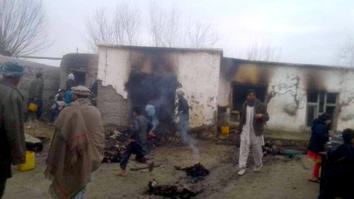KUNDUZ -- Taliban militants have destroyed a bridge in the Khwaja Changaal area of Takhar Province in an attempt to thwart the Afghan National Defence and Security Forces (ANDSF), local authorities and residents say.
The government built the bridge, which connected 20 villages and three neighbouring districts, two years ago.
On June 24, the Taliban blew up the bridge.
"This bridge was 100 metres long and connected a few districts with the capital of Takhar Province," said Takhar Provincial Council Secretary Muhammad Azam Afzali. "Because the water is so high on the Taloqan River, it is impossible to ford the river."
![This undated photo being circulated on social media shows the bridge after the Taliban blew it up June 24. [Facebook]](/cnmi_st/images/2019/07/04/18830-b-585_329.jpg)
This undated photo being circulated on social media shows the bridge after the Taliban blew it up June 24. [Facebook]
"The Taliban demolished the bridge to block the route so that government forces cannot come after them," he said. "We're worried that they will tear down three more bridges."
The three other bridges that are potential targets for the Taliban connect Rustaq, Khwaja Bahauddin, Chah Aab, Darqad, Yangi Qala and Dasht-e-Qala districts, Afzali said.
The Taliban have a history of destroying key infrastructure such as bridges and roads.
On July 31, 2015, the Taliban destroyed a 120-metre bridge over a river in Qala-e-Zal District, Kunduz Province. The bridge was built by the Ministry of Public Works.
The Taliban then destroyed Alchin Bridge on August 20, 2015, which used to connect four districts, as well as Central Asian countries, through Sher Khan Port to the Kunduz provincial capital.
Last September 16, the Taliban demolished a key 15-meter-long and 5-meter-wide overpass that connected Baghlan-e-Markazi District, Baghlan Province, to Pul-i-Khumri, the provincial capital.
More than just an inconvenience
The Taliban destroyed the bridge in Takhar in the middle of the night, and since then, no vehicle has been able to reach more than 20 villages, according to Mir Haider Qul, 45, a resident of Taloqan city.
"The Taliban tore down the bridge at 2am with powerful explosives in order to make sure the security forces could not follow them," he said. "With the bridge demolished, all routes from the villages to Taloqan city have been blocked."
Residents are facing food shortages and cannot take the sick or injured to hospitals, he said.
"Why are you destroying our bridges and roads to achieve the goals of others?" Qul said, addressing the Taliban.
"Be conscious and stay away from these destructive actions," he said. "You destroy roads. You have transformed schools, houses and hospitals into your havens and trenches. Why?"
"If anyone gets sick at midnight, we'll be lost as we don't know how to take them to the hospital," said Muhammad Aslam Hamed, 36, a resident of the Khwaja Changaal area.
"Most of the local residents are farmers, and if the bridge is not opened soon, their produce will rot and they will lose their source of income," he added.
"The [Taliban] destroy public property so blatantly, and they have no concern for the public's interests," said Maulawi Muhammad Issa Ghafoori, 52, a resident of Taloqan city.
"Public properties are our national capital, and destroying bridges, culverts, school buildings, roads and mosques is considered treason and disloyalty to the Afghan people," he said.
"If there is a little bit of Islam in one's heart, they don't destroy a bridge, a mosque or a road," Ghafoori said.
Rebuilding, taking action against Taliban
The implementation of public projects -- especially those that resolve citizens' problems -- are among the priorities of the Afghan government, said engineer Sebghatullah Nazari, director of rural rehabilitation and development in Takhar Province.
"When roads are blocked, it has negative consequences on everyone's life," he said. "Nobody can send his [or her] agricultural products to market, and taking patients to hospital also becomes very hard."
"When the security forces stabilise this area, our engineers will be able to come to the site and start working on rebuilding the bridge," Nazari said.
Afghan joint forces with support from the Afghan Air Force and NATO's Resolute Support Mission have launched clearing operations in Ishkamish, Baharak and Khwaja Ghar districts and along the major highways, said Khalil Aseer, spokesperson for the Takhar police chief.
The operation, titled Pamir–100, has been under way for a few days now, and has so far killed or injured more than 60 Taliban fighters, he said June 30.
"In recent night operations conducted by the security forces in four different areas in the outskirts of Taloqan city, they were able to oust the Taliban from a number of villages," he said.
"We're committed to clearing the insecure areas of the terrorists," Aseer said.
"In the past 10 days, the Taliban launched a series of extensive attacks to capture Ishkamish and Baharak districts of Takhar Province, but they were fortunately defeated," Col. Abdul Hadi Jamal, a spokesperson for the 217th Pamir Corps of the Afghan National Army, said June 30.
"I call on the Taliban to refrain from opposing the public and the security forces and to join the peace process," he said. "Otherwise, they will be annihilated by the [ANDSF]."

![This undated photo shows the bridge in the Khwaja Changaal area of Takhar Province before the Taliban militants demolished it on June 24. [Facebook]](/cnmi_st/images/2019/07/04/18829-takhar_bridge-585_329.jpg)






